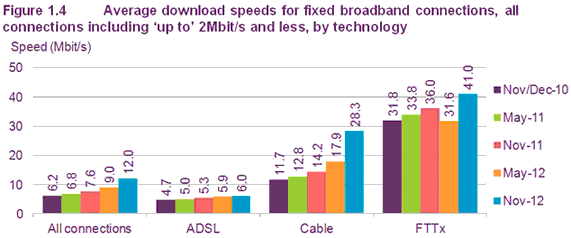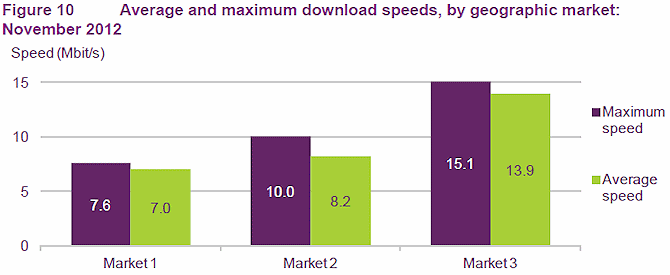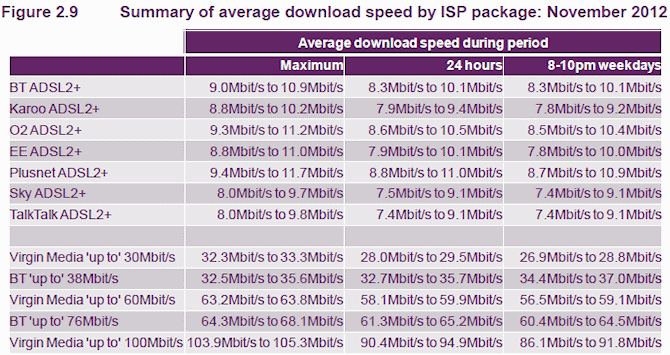UPD Average Fixed Broadband ISP Speeds in the UK Top 12Mbps Says Ofcom
The national telecoms regulator, Ofcom, has today revealed that the average fixed line broadband internet download speed in the United Kingdom have reached 12Mbps (Megabits per second), which represents a rise of 34% from the 9Mbps reported in their previous August 2012 study and just 3.6Mbps in November 2008.
The report, which is based on data collected during November 2012 by specially adapted routers installed in 2,019 UK homes, only covers the markets eight biggest ISPs and provides limited data for rural areas. Overall Ofcom’s data reveals the sharp performance difference between different broadband technologies and it also showcases how wide the Digital Divide is between urban and rural areas.
Advertisement
The average broadband download speed in rural areas is now 5.1Mbps (up from only 3.5Mbps in Aug 2012), which compares with 13.9Mbps in urban areas (up from 10.5Mbps). The average actual upload speed of a UK fixed broadband connection was also 1.4Mbps in November 2012 (up 30%).

The proportion of broadband connections classed as “superfast” (i.e. offering an “advertised speed” of up to 30Mbps+) is also on the increase and has now hit 13% of residential broadband connections, which is more than double the 5% in November 2011. Meanwhile residential superfast broadband connections saw average real-world speeds increasing from 35.8Mbps in May 2012 to 44.6Mbps in November 2012 (up 25%, mostly thanks to Virgin’s and BT’s faster service options and upgrades).
Interestingly Ofcom claims that there was “relatively little congestion” in BT’s fibre optic based broadband (FTTC / FTTP) network in November 2012, while levels of contention were higher in Virgin Media’s cable network.
A Spokesperson for BT told ISPreview.co.uk:
“Ofcom’s survey shows that BT’s customers are getting faster speeds than ever before and that BT’s fibre products provide the most reliable experience. It reveals our network is much more likely than Virgin’s to deliver the same speeds in the evening peak times when people most value their connection.
We are pleased that Ofcom noted that on some Virgin Media products up to two-thirds of customers saw a significant slowdown in speeds at peak times.
Customers should be wary of fast headline speeds that drop dramatically when most customers are online. Virgin Media admits that it manages traffic by up to 75 per cent if customers use their broadband too much, unlike BT’s new Totally Unlimited Broadband, which will never slow customers down.”
A Virgin Media spokesperson responded:
“Ofcom’s report proves that Virgin Media customers get the fastest broadband around, at peak times and all day long. We always deliver speeds far closer to our headline claims than BT manages at any time of day so BT is right to point out their network’s consistency – consistently failing to deliver what they promise.”
Separately Ofcom has also included data that compares the performance of broadband in Ofcom’s Market 1 areas (i.e. the last 10% of predominantly rural UK homes where BT is usually the sole provider) with more competitive locations in Market 2 and 3 areas (i.e. more ISP choice). Market 1 locations usually have longer lines and are the last to benefit from new technologies or competition, thus they frequently have slower performance.
Advertisement

Generally speaking ADSL2+ (standard broadband) lines are theoretically able to deliver speeds of up to 24Mbps (note: only a small percentage of mostly rural areas still use the older 8Mbps ADSL). Sadly DSL is highly susceptible to interference caused by issues like poor home wiring and long copper telephone lines, which partly explains why Ofcom’s real world data shows that they deliver well below what the technology itself claims.
By comparison BT’s FTTC technology, which also uses some copper wiring but mixes that with a good fibre optic link between the telephone exchange and your local street cabinet, promises speeds of up to 40Mbps or up to 80Mbps (depending upon your package) and thus tends to deliver significantly faster and more stable speeds.
Similarly Virgin Media’s cable (EuroDOCSIS) platform, which makes more use of coaxial cable but also has some copper and fibre like FTTC (i.e. FTTN), currently offers top speeds of between 30Mbps to 120Mbps and generally also manages to deliver a fairly strong and stable real-world performance.

It’s perhaps worth pointing out that FTTC technology is currently focused on dense urban areas that tend to receive a higher level of private investment, although public funding will soon push it out to rural locations where longer telephone lines could potentially begin to slow its speed.
Advertisement
Ed Richards, Ofcoms CEO, said:
“Our research shows that UK consumers are adopting faster broadband packages to cater for their increasing use of bandwidth-heavy services such as video streaming. The increase in the average number of connected devices in UK homes is also driving the need for speed.
Internet providers are working to meet consumer demand through network upgrades and the launch of superfast packages, giving consumers faster speeds and greater choice.”
As a quick aside the ASA guidelines for tackling misleading promotions of “up to” broadband speeds (full summary) requires ISPs to “demonstrate that [their] advertised speeds are achievable by at least 10% of users“, which has resulted in many ISPs simply hiding their speeds and thus preventing Ofcom from producing an advertised vs real-world speed comparison. Consumers can also find it harder to identify the differences between technology types.
Consumers who do suffer serious speed problems can sometimes get help through Ofcom’s Voluntary Broadband Speeds Code of Practice (Version 2), which requires member ISPs (Listed Here) to explain to new customers the access line speed that they’re likely to achieve at home, and to try to resolve any problems when speeds fall significantly below the estimate. If the problem cannot be resolved then customers should be able to leave their provider, without penalty, within the first 3 months of a contract.
Ofcom’s UK Fixed-Line Broadband Performance Study November 2012
http://stakeholders.ofcom.org.uk/../nov2012/Fixed_bb_speeds_Nov_2012.pdf
UPDATE 12:19am
Added a comment from Virgin Media above.
Mark is a professional technology writer, IT consultant and computer engineer from Dorset (England), he also founded ISPreview in 1999 and enjoys analysing the latest telecoms and broadband developments. Find me on X (Twitter), Mastodon, Facebook, BlueSky, Threads.net and Linkedin.
« UK ISP TalkTalk Offers 3 Months FREE Unlimited Broadband and Calls

















































Comments are closed